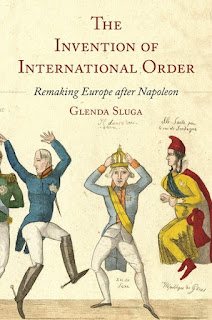 professor of international history at the University of Sydney. Her books include Internationalism in the Age of Nationalism and Women, Diplomacy, and International Politics since 1500.
professor of international history at the University of Sydney. Her books include Internationalism in the Age of Nationalism and Women, Diplomacy, and International Politics since 1500.
Sluga applied the “Page 99 Test” to her new book, The Invention of International Order: Remaking Europe after Napoleon, and reported the following:
On page 99 of The Invention of International Order a significant shift in the narrative takes place: The story moves from a minor moment in the Allied campaign against Napoleon, to the apogee of its victory in 1814. As fragmented as the presentation of this narrative shift is here, it can serve a purpose, hinting at two of the book’s main themes, and, as importantly the anomalies that are its focus. First, there is the evidence of women’s presence in what is a military and political history. Second, there is the fact of Russian Tsar Alexander’s leadership of a liberal, liberated Europe. These same (here limited) examples invoke the substantial core of the argument of The Invention of International Order, namely that 200 years ago women were there, and that the politics between states encompassed ambitions that have since been forgotten.Learn more about The Invention of International Order at the Princeton University Press website.
The transformations that took place in European politics from 1812, as a result of the Allied campaign, and the processes of peacemaking that followed in 1814 and after, breathed life into new ways of doing politics between states, as women and men, bourgeois and aristocratic, non-state and state “actors” engaged political possibilities in unprecedented ways, to diverse political ends. When we include their histories, the narrative of how an international order was invented becomes the story of not only the ideas, practices and institutions that remained influential, but also long forgotten expectations of what an international politics might be.
At least that’s one side of the history; the other side is the sum of the processes of ‘ordering’—whether gender roles and relations or the differentiation of classes and civilizations. It is not inconsequential that, at the beginning of the 19th century, Russia led the European coalition against Napoleon, and even espoused a liberal political agenda for the international order, and by the mid 19th century it had the status of a pariah state, or that women missed out in a new international order based on the professionalisation of diplomacy, despite their traditional importance to the shaping of foreign policy and processes of negotiation.
With all its paradoxes, the point of The Invention of International Order is to illustrate that the longer 200-year history of diplomacy and its politics matters. The enlargement of political ambition, and of political engagement, among women as well as men, the imagining of an international order that impacted individual lives and deserved to be taken seriously as a site of politics—these characteristics tended to surface at critical century moments of disruption, not least in 1919 and 1945. Then as in 1814, a window briefly opened was soon closed; the world was repeatedly left with the shell of ambition and expectation, and the skeletons of bravely imagined institutions and practices.
--Marshal Zeringue



